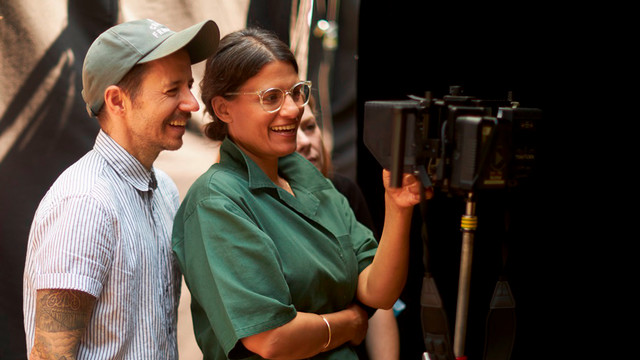Richmond professor's new documentary premieres at Toronto Hot Docs Film Festival
Arts
‘The Nest’ shares the story of Julietta Singh's childhood home haunted by 140 years of forgotten matriarchs and political rebels.
University of Richmond professor Julietta Singh sought to learn more about the history of her sprawling childhood home in Winnipeg, Manitoba, as a means of connecting with her mother.
“The border was closed between Canada and the U.S. during the pandemic, and I couldn't travel to see her. I started doing this research project because she was quite disabled and confronting the end of living in that house,” Singh said. “As I started researching, I discovered all these extraordinary stories that I had never known.”

The result is The Nest, a feature-length documentary co-directed by Singh and her friend, filmmaker Chase Joynt. On April 27, the film had its world premiere at Toronto’s Hot Docs Film Festival, the largest documentary film festival in North America. It was selected to be one of the special presentations. It is Singh's directorial debut.
As Singh delved into the history of her family home, she uncovered 140 years of individuals who were Indigenous, Deaf, Japanese, or had other marginalized backgrounds, all connected through the same house.
One of the stories involved a Red River Métis woman named Annie Bannatyne. She was a highly educated, wealthy philanthropist married to prominent businessman A.G.B. Bannatyne.
While her history had been forgotten for many years, “Annie has resurfaced as a kind of iconic feminist Métis heroine,” Singh said. “She was an incredible woman who built the house for her son in 1882. She lived in a castle next door.”
Her son’s home, where he lived with his wife and two children, was nicknamed “The Nest.” While the house remained, Bannatyne’s castle was demolished in the 1950s.
The discovery of Bannatyne surprised Singh, the Stephanie Bennett-Smith Chair of Women, Gender, & Sexuality Studies and Professor of English. “We grew up in a world that couldn't imagine a relationship between Indigenous people and wealth. And this led us to ask: Who else was here?”
During the film's creation, she met the great-great-granddaughter of Annie Bannatyne, who had inherited a portrait and other artifacts belonging to her famous relative. The family’s Indigenous roots had long been hidden, along with the portrait.
The home had also once served as a Japanese Consulate of Manitoba and a school for the Deaf.
Singh’s family moved into the home in 1980. They acquired it for the value of the land because it was rundown at the time. Her mother spent decades restoring and preserving it to its original grandeur.
As a child, Singh admired the Queen Anne-style Victorian mansion but also found it frightening. During her first visit, she got lost in the house.

Reclaiming the Nest
“My parents came from very different cultures at a very racist time in Winnipeg history. My dad was a South Asian Sikh man, and my mom was an Irish immigrant,” Singh said. “They clashed a lot.” Her parents divorced, and Singh’s mother operated a bed-and-breakfast out of the home for decades. She still lives there.
“Part of the project for me was about returning home to a place that I had never really felt that I belonged, both in terms of being from an immigrant family in Winnipeg, but also to a home that didn't really feel like a home to me,” she said, “and figuring out how to find my place there through this project.”
Singh unearthed the home’s nickname during her research.
“I had grown up with the house being called Beechmont, which had been the name that a wealthy, colonial banker had bestowed on it in the early 1900s when he moved in,” she said, “And so ‘The Nest’ was a reclaimed name.”
The name also became a way for the filmmakers to approach their project.
“If you think about a bird's nest, you think about bits and pieces of grass or materials woven together to create something,” Singh said. “That's how we thought about the construction of the film. We were drawing together little scraps and traces of history, with it all coming together to build a whole.”
Singh has taught at UR since 2010. She is the author of The Breaks, No Archive Will Restore You, and Unthinking Mastery: Dehumanism and Decolonial Entanglements.

